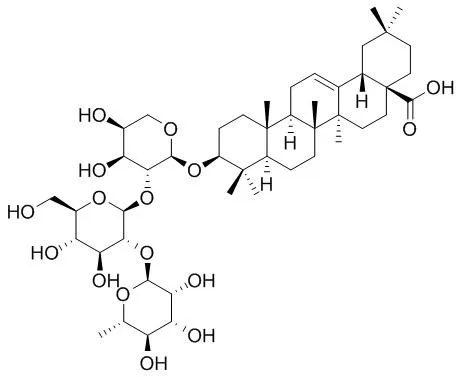| Description: |
Raddeanin A, a histone deacetylases (HDACs) inhibitor, has high antiangiogenic potency, and antitumor activity, it can suppress the growth of liver and cells, it also inhibits proliferation of GC cells (BGC-823, SGC-7901 and MKN-28), induces their and inhibits the abilities of invasion, migration. |
| In vitro: |
| Phytomedicine. 2015 Jan 15;22(1):103-10. | | Raddeanin A, a triterpenoid saponin isolated from Anemone raddeana, suppresses the angiogenesis and growth of human colorectal tumor by inhibiting VEGFR2 signaling.[Pubmed: 25636878] | Raddeanin A (RA) is an active triterpenoid saponin from a traditional Chinese medicinal herb, Anemone raddeana Regel. It was previously reported that RA possessed attractive antitumor activity through inhibiting proliferation and inducing apoptosis of multiple cancer cells.
However, whether RA can inhibit angiogenesis, an essential step in cancer development, remains unknown.
METHODS AND RESULTS:
In this study, we found that RA could significantly inhibit human umbilical vein endothelial cell (HUVEC) proliferation, motility, migration, and tube formation. RA also dramatically reduced angiogenesis in chick embryo chorioallantoic membrane (CAM), restrained the trunk angiogenesis in zebrafish, and suppressed angiogenesis and growth of human HCT-15 colorectal cancer xenograft in mice. Western blot assay showed that RA suppressed VEGF-induced phosphorylation of VEGFR2 and its downstream protein kinases including PLCγ1, JAK2, FAK, Src, and Akt. Molecular docking simulation indicated that RA formed hydrogen bonds and hydrophobic interactions within the ATP binding pocket of VEGFR2 kinase domain.
CONCLUSIONS:
Our study firstly provides the evidence that RA has high antiangiogenic potency and explores its molecular basis, demonstrating that RA is a potential agent or lead candidate for antiangiogenic cancer therapy. | | Biochem Biophys Res Commun. 2013 Sep 20;439(2):196-202. | | Raddeanin A induces human gastric cancer cells apoptosis and inhibits their invasion in vitro.[Pubmed: 23988447] | Raddeanin A is one of the triterpenoid saponins in herbal medicine Anemone raddeana Regel which was reported to suppress the growth of liver and lung cancer cells. However, little was known about its effect on gastric cancer (GC) cells.
This study aimed to investigate its inhibitory effect on three kinds of different differentiation stage GC cells (BGC-823, SGC-7901 and MKN-28) in vitro and the possible mechanisms.
METHODS AND RESULTS:
Proliferation assay and flow cytometry demonstrated Raddeanin A's dose-dependent inhibitory effect and determined its induction of cells apoptosis, respectively. Transwell assay, wounding heal assay and cell matrix adhesion assay showed that Raddeanin A significantly inhibited the abilities of the invasion, migration and adhesion of the BGC-823 cells. Moreover, quantitative real time PCR and Western blot analysis found that Raddeanin A increased Bax expression while reduced Bcl-2, Bcl-xL and Survivin expressions and significantly activated caspase-3, caspase-8, caspase-9 and poly-ADP ribose polymerase (PARP). Besides, Raddeanin A could also up-regulate the expression of reversion inducing cysteine rich protein with Kazal motifs (RECK), E-cadherin (E-cad) and down-regulate the expression of matrix metalloproteinases-2 (MMP-2), MMP-9, MMP-14 and Rhoc.
CONCLUSIONS:
In conclusion, Raddeanin A inhibits proliferation of human GC cells, induces their apoptosis and inhibits the abilities of invasion, migration and adhesion, exhibiting potential to become antitumor drug. |
|






 Cell. 2018 Jan 11;172(1-2):249-261.e12. doi: 10.1016/j.cell.2017.12.019.IF=36.216(2019)
Cell. 2018 Jan 11;172(1-2):249-261.e12. doi: 10.1016/j.cell.2017.12.019.IF=36.216(2019) Cell Metab. 2020 Mar 3;31(3):534-548.e5. doi: 10.1016/j.cmet.2020.01.002.IF=22.415(2019)
Cell Metab. 2020 Mar 3;31(3):534-548.e5. doi: 10.1016/j.cmet.2020.01.002.IF=22.415(2019) Mol Cell. 2017 Nov 16;68(4):673-685.e6. doi: 10.1016/j.molcel.2017.10.022.IF=14.548(2019)
Mol Cell. 2017 Nov 16;68(4):673-685.e6. doi: 10.1016/j.molcel.2017.10.022.IF=14.548(2019)